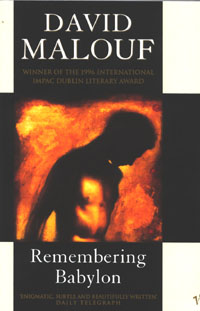Remembering Babylon by David Malouf

First, this novel is worth reading because Malouf’s style is fabulous. Secondly he creates tension and suspense by writing dispassionately about passion and prejudice and love and fear. Sometime in the mid 19th century, settlers in a small community in
There were no welfare agencies, no government policies for victims, no procedures for passing on the refugee. It was not even a village really, just an agricultural settlement where families lived and worked at a subsistence level; church and school, pastor and schoolmaster, plus the camaraderie of the families facing similar hardships held the community together. As did the fears they had in common, such as fear of attack by Aboriginals. When Gemmy Fairly appeared, many of the settlers feared that he would bring down the wrath of his former protectors on the settlement, even that he was an advance guard set ahead of the attach, and those fears superseded concern for the welfare of this Englishman who had, in fact, grown to adulthood with savages so that he seemed more like them than his own people.
One family, the McIvor’s—Scottish immigrant family consisting of father, mother, two daughters and a nephew—take in Gemmy. He had first made himself known to Janet and Meg and Lachlan, appearing before them without prior warning—just as they’d experienced with Aboriginals, barely managing to ask them not to shoot, he was British: “Do not shoot. I am British object”.
The book spans a period of at least 50 years from the time Gemmy appeared in the settlement, more if you consider the back stories Malouf provides. Chapters don’t so much follow a story line as sketch in a background and a foreground, from Mrs. McIvor’s choice of a husband who would not follow her brothers into the coal mines to how the educated schoolmaster and the pastor ended up in such an isolated spot, to a focus on the settlers whose primal fear of the Aboriginals clearly extended to the unfortunate white man who’d been rescued by the community. The incident of Gemmy Fairly turns out to be catalyst in the significant life choices made by the two main characters (if such they can be called) Janet McIvor and her cousin, Lachlan Beattie, who meet during the time of WWI, a nun and a politician, tied to each other and the Queensland settlement by the most significant event in their moral lives—and by extension in that of their country.
A guess on the title: It's Gemmy who "remembers 

0 Comments:
Post a Comment
<< Home